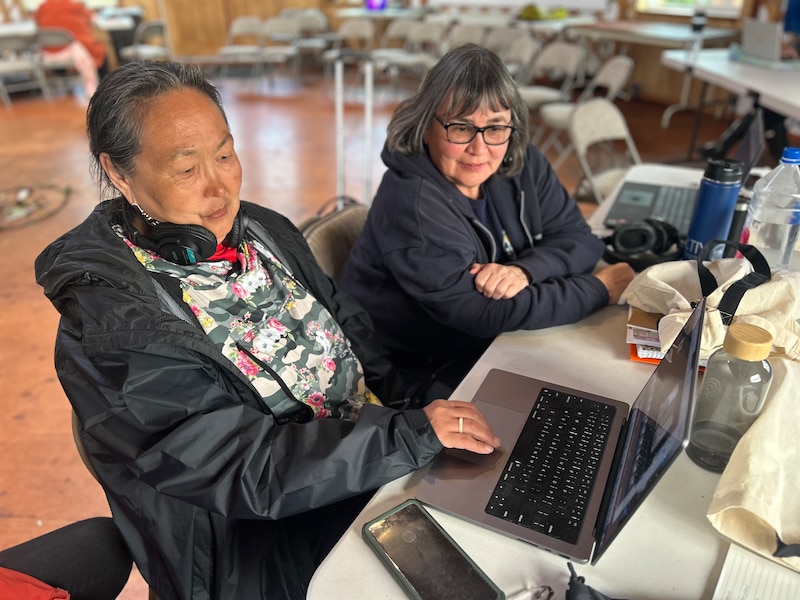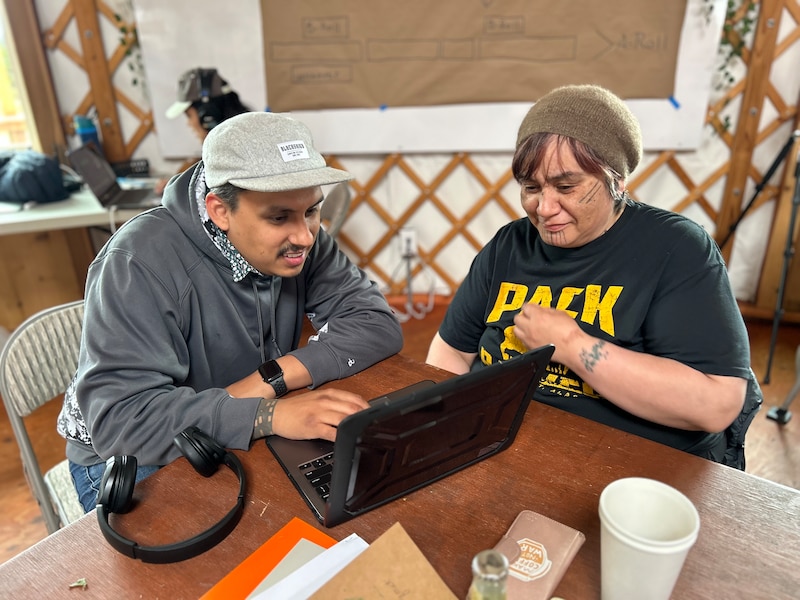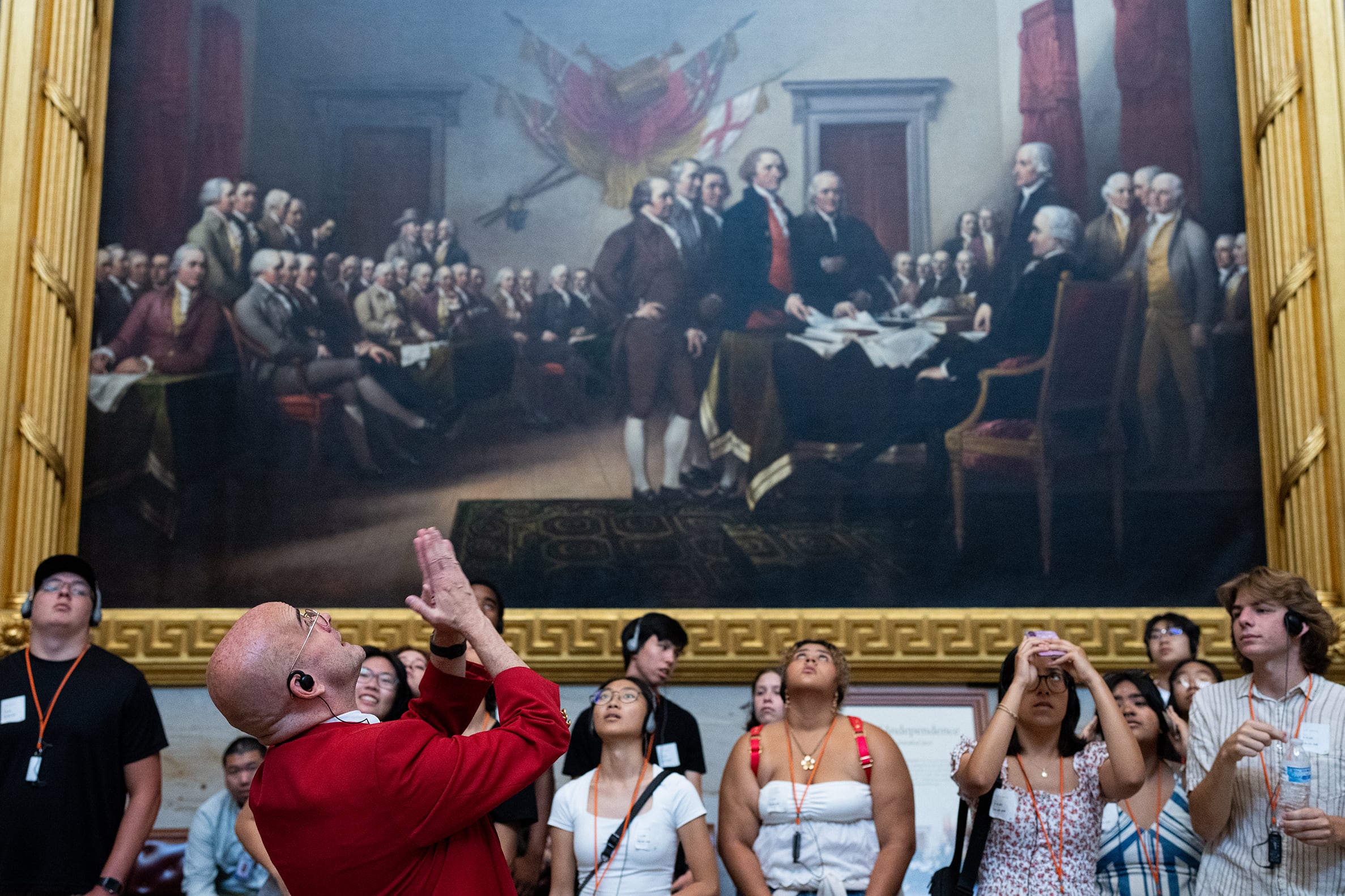Sign up for Chalkbeat’s free weekly newsletter to keep up with how education is changing across the U.S.
Jessica Ellison hopes she has a compelling pitch for the Trump administration’s new history and civics initiative connected with the 250th anniversary of the signing of the Declaration of Independence: “Yes, George Washington, and also …”
She envisions helping teachers incorporate fascinating but overlooked figures into their lessons, such as Mary Katharine Goddard, a printer for the Continental Congress who bravely published the Declaration and put her name on it. Rural and elementary school teachers, who often get less social studies training, would be the target audience.
“You can’t throw a rock in Virginia without hitting something related to the Revolution, but in Kansas, how do they make that connection?” said Ellison, the executive director of the National Council for History Education. The goal would be “to help teachers find connections to their place, and to think about the principles of the Declaration not just in 1776, but through the present.”
But is that what the Trump administration wants?
President Donald Trump and those close to him see the nation’s semiquincentennial as an opportunity to advance his broader political agenda. When the president kicked off the year-long commemoration earlier this month, he celebrated the passage of the Republican-led tax and spending bill.
At the U.S. Department of Education, the goal of the history and civics grant Ellison is applying for is to cultivate “citizen competency and informed patriotism” with a focus on “the first principles of the Founding” and how they’ve developed over time. Extra points go to applications from independent civics centers, several of which were recently created at public universities with backing from Republican state lawmakers.
To pay for this $14 million program, Trump’s Education Department is taking away money from recipients of a Biden-era history and civics grant that sought to help children from low-income families and other underserved students. That work, the Trump administration now says, was “illegal DEI programming,” referring to diversity, equity, and inclusion.
The funding swap is a telling example of how the Trump administration is looking to take history and civics education in a new direction, turning away from how the painful parts of American history still reverberate today, and advancing a more patriotic and positive version of America that’s put its most challenging times behind it.
In January, Trump signed an executive order to bring back the 1776 Commission, originally created during his first term, to advise on planning the 250th anniversary and promote “patriotic education.” The order defines that in part as an “examination of how the United States has admirably grown closer to its noble principles.”
The shift also highlights the political tightrope many educators are walking, and the fact that money for this kind of teacher training is hard to find. Several organizations that lost funding, including Ellison’s, submitted a proposal for the 250th anniversary program — meaning they are essentially applying for money that used to be theirs.
The Center for Civic Education, which trains teachers and runs civics education programs for K-12 students, is in that boat. Donna Phillips, the nonprofit’s president and CEO, said while her organization appeals its discontinued funding, she’s trying to stay focused on how federal grants have allowed her nonprofit to understand how kids learn civics and figure out what teachers need for 30 years. This new program could do that, too.
“You really have to set aside what’s happening and then also see: Well, actually, this is an additional opportunity,” Phillips said. “It’s really hard. Every day, we wake up and try to figure out: What can we do today to continue doing the right thing, to continue fulfilling our mission within the new playbook?”
The many tensions in teaching civics and history
Some of these tensions are rooted in education policy shifts and debates over how civics and U.S. history should be taught.
Prior to the 1960s, American high schoolers typically took three civics classes, but now most states require just a semester-long class, if that. When the federal No Child Left Behind Act passed in 2002, it tied school performance to math and reading scores, so teacher training tended to focus on those subjects, too.
That’s left teachers feeling less prepared to teach civics and younger Americans less knowledgeable about civics than earlier generations, according to a 2024 brief published by the Sandra Day O’Connor Institute for American Democracy, a nonprofit that focuses on civics education.
Recent national surveys have found 1 in 3 American adults cannot name all three branches of government, and 1 in 5 can’t name any of the freedoms protected under the First Amendment.
At the same time, some states have added new requirements to teach Black, Latino, Asian American, and Indigenous history. Other states have passed laws that limit what schools can teach about topics like systemic racism and LGBTQ history.
Since 2016, the year Trump won his first presidential election, civics instruction has caused more trepidation in schools, said Tina Ellsworth, an assistant professor at Northwest Missouri State University who focuses on social studies education. National surveys have shown many teachers feel pressure to limit discussions about certain political and social issues in their classrooms, regardless of state laws.
“There’s a lot of administrators that aren’t necessarily overtly supportive” of teaching the civics content and skills students need to engage with the world, Ellsworth said.
Over the last decade, there’s been more focus on teaching students how to build civics skills and media literacy, said Phillips of the Center for Civic Education. But this new grant seems focused more on content knowledge, she said.
The Center for American Civics at Arizona State University submitted a proposal to adapt its teacher training on America’s founding to serve more rural Arizona teachers and those in other states.
Paul Carrese, the center’s director, said that if awarded the grant, he envisions staying true to the center’s approach that teaching “civic knowledge,” or key moments and people in history, “should be first or foundational.” But preparing students to have healthy debates and disagreements, skills he calls “civic virtues,” are also a must.
When people bring up civics, “liberals and conservatives hear different things,” said David Griffith, the associate director of research at the Thomas B. Fordham Institute, a conservative think tank, who has studied history and civics standards across the country.
Liberals tend to envision public policy and civic discourse — a more future-oriented view — while conservatives think about respect for traditions and historical moments like the Constitutional Convention, Griffith said.
Young people need both, Griffith said, but striking the right balance is difficult.
“We want to prepare kids for citizenship, and we can’t possibly do that if we never talk about anything that might be in the news,” Griffith said. “But we also don’t want teachers to put their thumbs on the scale and be seen as engaging in activism.”
‘We’re not telling students what to think’
Those tensions have been on display as the Trump administration decides what kinds of history and civics instruction to fund.
Savannah Newhouse, a press secretary for the Education Department, said in an email that the Trump administration ended some Biden-era history and civics education grants after “a thorough review found they were being used toward illegal DEI programming.”
Newhouse did not provide examples. But in a June 18 letter, Murray Bessette, a senior adviser at the department, told organizations whose projects were being canceled that their work conflicted with the department’s “policy of prioritizing merit, fairness, and excellence in education,” violated federal civil rights law, or undermined “the well-being of the students these programs are intended to help.”
The Education Department did not respond to questions about which projects were canceled. But Chalkbeat confirmed that at least 11 of the 25 grants awarded under the Biden administration would end in September, a year early. Several organizations have filed appeals, hoping to get their funding reinstated.
The National Council for History Education, for example, is asking the Trump administration to reconsider taking funds from a project that trained dozens of teachers in the St. Louis area in civil rights education and brought them to historic sites in Missouri and Philadelphia.
Ellison is unsure why that program lost money, while the organization kept its funding for a similar training program in Broward County, Florida that examines the role of St. Augustine, Florida in the slave trade and Spanish colonialism, discusses Indigenous peoples, and involves a visit to Colonial Williamsburg.
In the announcement for the new grant program, the Trump administration expressed interest in “an accurate and honest account of American history” showing “how the United States has worked through profound challenges to its ideals,” such as slavery and segregation.
See Stories, a nonprofit that trains teachers in digital storytelling, is also appealing with a letter of support from Alaska’s Republican Sen. Lisa Murkowski, who saw the organization’s work firsthand when she met students documenting the U.S. Navy’s apology for destroying two Tlingít villages in the late 1800s.

The program has trained dozens of Alaska teachers to teach their students, many of whom are Alaska Native, how to make short documentaries about what’s happening in their communities and their lives, said Marie Acemah, the nonprofit’s founder and director.
A team of archivists shows teachers how to find resources online, while the See Stories team lays out best practices for inviting elders into classrooms and teaching students how to interview their grandparents as primary sources. The videos are saved and cataloged so other Alaska teachers can use them with their own lessons.
Many teachers moved to Alaska from the lower 48, Acemah said, and may not know all the rules or traditions of the smaller villages where they teach. This gives them “practice and courage,” she said. She hopes the Education Department will decide that’s consistent with its vision.

“We’re not telling teachers what to think, we’re not telling students what to think, we’re not excluding anybody from our program,” Acemah said. “Our focus is getting students to understand the power of their own voices, of their own histories, and how to physically engage in meaningful and constructive ways.”
Melissa Gibson, an associate professor of educational policy and leadership at Marquette University, is also appealing the Education Department’s decision to stop funding the Milwaukee Roots initiative. Teachers meet with scholars and neighborhood experts to learn about different parts of the city, and how students can conduct a historical inquiry, an approach emphasized in Wisconsin social studies standards.
At the same time, Gibson is applying for the new 250th anniversary funding, in conjunction with Marquette’s civics center. In her proposal, she tried to combine what the grant asked for with her team’s focus on place-based civics instruction and lifting up overlooked voices.
The students Gibson works with, many of whom are incarcerated, often feel like government has failed them, there’s no difference between the two main political parties, and that nothing ever changes in their city or state, she said.
“What’s missing from those complaints is the understanding that in fact, you, as a citizen, have the power to improve those structures,” Gibson said.
Learning about America’s 250th birthday could help them see both the “poetry of our founding documents” and “people’s lived reality” — and envision what it might take to make those the same.
Kalyn Belsha is a senior national education reporter based in Chicago. Contact her at kbelsha@chalkbeat.org.






